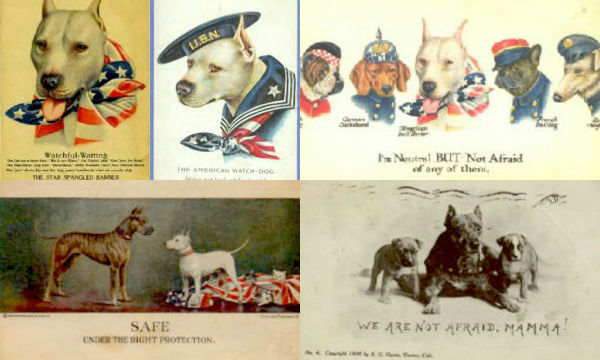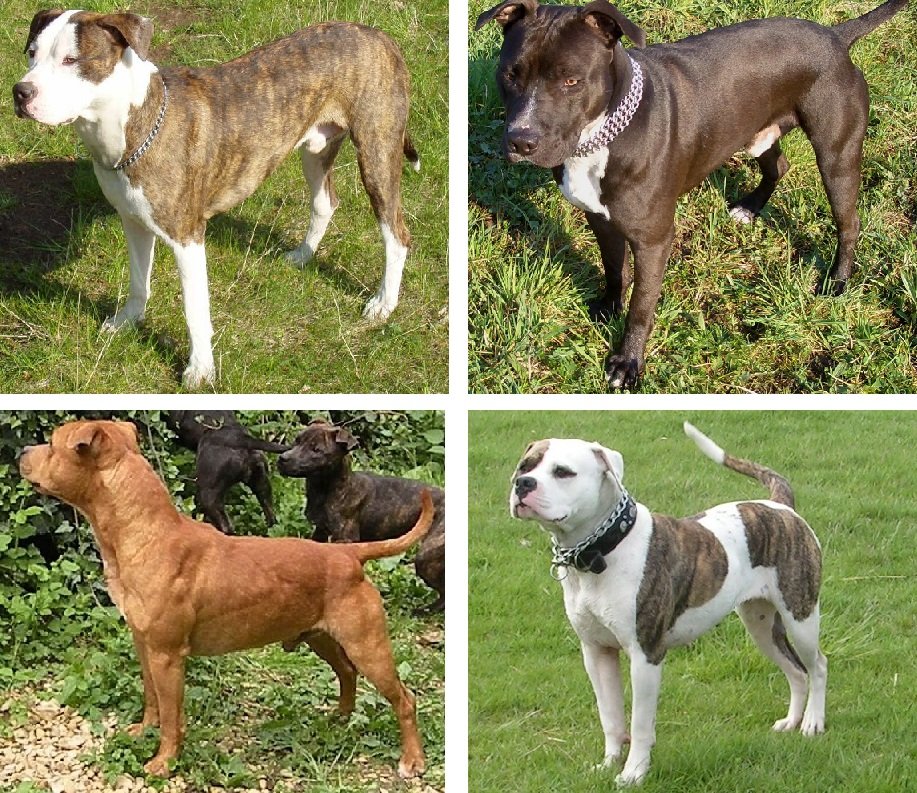Did you know that the name Pitbull actually originates from America? Despite what some may think, it isn’t a reference to the breed’s aggressive nature. In fact, the name comes from the dog’s historical association with bull-baiting, a popular sport in the 19th century.
The name Pitbull is derived from the combination of the words “pit” and “bull”. These dogs were often used in pit fights against bulls, bears, and even other dogs. However, the breed has come a long way since then, and today, Pitbulls are known for their loyalty, strength, and friendly nature. They have become popular family pets and therapy dogs, bringing joy and comfort to many people’s lives. Despite their misunderstood reputation, Pitbulls are proving to be loving and devoted companions when given the proper care and training. It’s important to remember that a dog’s behavior ultimately depends on how they are raised and treated by their owners.

Where Does the Name Pitbull Come From?
Pitbulls are a popular breed of dog known for their strength, loyalty, and versatility. But have you ever wondered where the name “Pitbull” comes from? In this article, we will explore the origins of the name Pitbull and shed light on the history and significance behind it.
The Origins of the Name Pitbull
The name “Pitbull” originated from the fact that these dogs were originally bred for “pit” fighting. Pit fighting was a popular form of entertainment in the 18th and 19th centuries, where dogs were pitted against each other in a pit or arena while spectators placed bets on the outcome. Pitbulls, with their strong jaws and muscular build, were the preferred breed for this purpose.
It is believed that the term “Pitbull” was first used in the early 20th century to describe these dogs. The name was used to distinguish them from other breeds and to emphasize their connection to pit fighting. Over time, the term became widely adopted and is now used to refer to various breeds that share similar characteristics.
Despite their historical association with pit fighting, Pitbulls are now beloved family pets known for their loyalty, affectionate nature, and intelligence. It’s important to note that responsible ownership and training are crucial to ensuring that these dogs are well-behaved and friendly members of society.
Types of Pitbull Breeds
When we talk about Pitbulls, it’s important to note that the term is often used to refer to a group of breeds that share certain physical traits and characteristics. The four main breeds commonly referred to as Pitbulls are the American Pit Bull Terrier, the American Staffordshire Terrier, the Staffordshire Bull Terrier, and the American Bully.
The American Pit Bull Terrier is the breed most closely associated with the term “Pitbull.” It is a medium-sized, muscular dog known for its strength and agility. The American Staffordshire Terrier and the Staffordshire Bull Terrier are also commonly referred to as Pitbulls. They are smaller in size but still possess the same strong and muscular build. Lastly, the American Bully is a newer breed that has gained popularity in recent years. It is a larger and bulkier dog with a friendly and outgoing temperament.
Each of these breeds has its own unique characteristics and temperaments, but they all share the name Pitbull due to their common ancestry and physical similarities. It’s worth noting that Pitbulls, like any other breed, can vary greatly in temperament and behavior depending on their individual upbringing, training, and socialization.
The Controversy Surrounding Pitbulls
Pitbulls have unfortunately gained a reputation for being aggressive and dangerous, which has led to breed-specific legislation and public fear. However, it is important to recognize that a dog’s behavior is primarily influenced by their environment and the way they are raised and trained by their owners.
Proponents of Pitbulls argue that they are unfairly stigmatized and that their reputation is undeserved. They emphasize that Pitbulls can be loving, loyal, and well-behaved companions when raised in a responsible and caring environment. They also highlight the positive qualities of Pitbulls, such as their intelligence, trainability, and affectionate nature.
It’s important to approach the topic of Pitbulls with an open mind and rely on accurate information rather than stereotypes. Responsible ownership, proper training, and socialization are key to ensuring that Pitbulls, like any other breed, can be loving and well-behaved members of society.
Tips for Owning a Pitbull
If you are considering getting a Pitbull or already have one, here are some tips to ensure a positive and fulfilling ownership experience:
- Start with a reputable breeder or consider adopting from a reputable rescue organization.
- Provide consistent training and socialization from a young age to mold their behavior and ensure they are well-rounded dogs.
- Invest time and effort into their physical and mental stimulation, as Pitbulls are known for their high energy levels.
- Follow responsible ownership practices, including regular veterinary care, proper nutrition, and providing a safe and loving environment.
- Be aware of your local regulations and laws regarding Pitbull ownership to ensure you are in compliance.
Pitbulls in Pop Culture
Pitbulls have made appearances in various forms of popular culture, from movies and TV shows to music. Their strength, loyalty, and unique appearance have made them an appealing choice for artists and creators. For example, in the movie “The Little Rascals,” Petey, the iconic white and black dog, was a Pitbull mix. Pitbulls have also been featured in music videos and album covers by artists like Pitbull himself, who chose the name to symbolize strength and resilience.
The portrayal of Pitbulls in pop culture can have both positive and negative effects. On one hand, it can help challenge stereotypes and increase awareness about the true nature of these dogs. On the other hand, it’s important for media representations to accurately reflect the diversity and individuality of Pitbulls, rather than perpetuating stereotypes or fear-based narratives.
Conclusion
The name Pitbull originated from the association with pit fighting, a practice that is now thankfully banned and widely condemned. Today, Pitbulls are beloved family pets who are known for their loyalty, affection, and intelligence. Despite the controversy and stigma surrounding them, responsible ownership and proper training can help ensure that Pitbulls are happy, well-adjusted, and friendly companions. By understanding the origins of the name Pitbull and challenging misconceptions, we can contribute to a more inclusive and accurate perception of these amazing dogs.
Key Takeaways: Where Does the Name Pitbull Come From?
- The name “Pitbull” refers to a specific breed of dog known for its strength and determination.
- Pitbulls were originally bred for bull-baiting, a cruel sport popular in 19th century England.
- The breed’s name comes from the fact that they were often used in pits to hold bulls during the sport.
- Over time, the cruel sport was banned, and pitbulls were used for other purposes, such as hunting and working on farms.
- Today, pitbulls are popular as family pets and often misunderstood due to their history and reputation.
Frequently Asked Questions
Are you curious about the origin of the name “Pitbull”? Find out more below!
1. What is the origin of the name Pitbull?
The name “Pitbull” originated from the breed’s ancestry and the historical purpose of dog fighting. These dogs were commonly used in pit fights due to their strength, agility, and tenacity. They were bred specifically for this activity and were popularly referred to as “pit dogs” or “pit bulls.”
Over time, the term “pit bull” became synonymous with this specific type of dog, leading to the name we commonly use today. It is important to note that “Pitbull” is not a specific breed but a general term encompassing several breeds known for their physical traits and abilities.
2. Which dog breeds fall under the term “Pitbull”?
The term “Pitbull” typically includes several breeds, such as the American Pit Bull Terrier, American Staffordshire Terrier, Staffordshire Bull Terrier, and sometimes the Bull Terrier. These breeds share similar characteristics, including muscular bodies, strong jaws, and a determined temperament.
However, it’s essential to remember that individual dogs within these breeds may vary in terms of behavior and temperament. Each dog has its own unique personality, shaped by factors such as genetics, environment, and training.
3. Why are Pitbulls often misunderstood and stigmatized?
Pitbulls are often misunderstood and stigmatized due to misconceptions and negative media portrayal. Sensationalized stories and biased reporting have perpetuated the idea that all Pitbulls are inherently aggressive and dangerous.
In reality, a dog’s behavior is influenced by various factors, such as genetics, training, socialization, and owner responsibility. Responsible ownership and proper training can help shape a Pitbull into a well-behaved and friendly companion.
4. Are Pitbulls inherently aggressive?
No, Pitbulls are not inherently aggressive. Like any other breed, a dog’s behavior depends on factors such as genetics, upbringing, and socialization. With proper training, socialization, and responsible ownership, Pitbulls can be loving, gentle pets. It’s important to remember that generalizations based on breed can be misleading and unfair to individual dogs.
It is worth noting that some Pitbulls may exhibit certain traits like stubbornness or a tendency to be protective. These traits can be managed through appropriate training and proper guidance from their owners.
5. How can we combat the negative stigma surrounding Pitbulls?
One of the best ways to combat the negative stigma surrounding Pitbulls is through education and responsible ownership. Promoting accurate information about the breed, highlighting positive experiences, and sharing stories of well-behaved Pitbulls can help dispel misconceptions.
Additionally, responsible ownership involves socializing your Pitbull from a young age, providing proper training, and being a responsible advocate for the breed. By setting a positive example and showing the true nature of Pitbulls, we can work towards changing public perceptions and promoting a more inclusive and understanding society.

Summary:
So, where does the name Pitbull come from? Well, it doesn’t actually refer to the breed of dog. Instead, Pitbull is a term used to describe certain types of dogs that share similar physical characteristics. These dogs are strong, muscular, and often have short hair. The name Pitbull comes from their historical association with dog fighting, a cruel and illegal activity. However, it’s important to remember that not all Pitbulls are aggressive. Just like any other dog, their behavior depends on their upbringing and environment. It’s crucial to treat all dogs with love, care, and respect.
In conclusion, Pitbull is not a specific breed but rather a label for dogs with certain physical traits. Although they have a history of being bred and trained for dog fighting, not all Pitbulls are aggressive. Every dog deserves compassion and a safe, nurturing home.
